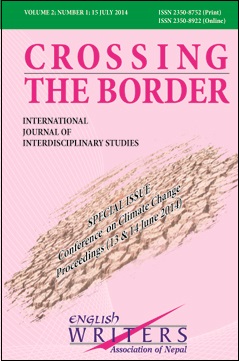Anthropological Perspectives on Natural Resources Management, Climate Change and Global Warming: From Quandary to Actions
DOI:
https://doi.org/10.3126/ctbijis.v2i1.10815Keywords:
Integrative approach, paradigms, periphery, biotic, anthropogenic, livelihoodAbstract
Anthropology brings its core theoretical tenet that culture frames the way people perceive, understand, experience, and respond to key elements of the worlds which they live in. This framing is grounded in systems of meanings and relationships that mediate human engagements with natural phenomena and processes including climate change. Anthropology’s potential contributions to natural resources, climate and global warming researches are the description and analysis of the mediating layers of cultural meanings, norms and social practices, which cannot be easily incarcerate by methods of other disciplines. There are vital key contributions that anthropology can bring to understandings of climate change. The foremost is awareness to the cultural values and political relations that shape the production and interpretation of climate change knowledge and shape the basis of responses to ongoing environmental changes as ecological colonialism. Anthropological knowledge is holistic –referring to the study of the whole of the human condition: past, present, and future; biology, society, language, and culture. Climate change is ultimately about culture, for in its wake, more and more of the intimate human-environment relations, fundamental to the world’s cultural diversity. Anthropological lens cram to learn about human significance of climate change by studying the manner and the knowledge system of people in different cultures and communities to understand to the new threats of climate change, global warming and the local responses to tackle the menace. Through anthropological lenses on the scale of global geopolitics, anthropologists perceive the causes and effects of climate change to be about people and their life, survival, power, ethics and morals, environmental costs and justice, and cultural and spiritual endurance with a perception Raise Your Voice Not Sea Level.
DOI: http://dx.doi.org/10.3126/ctbijis.v2i1.10815
Crossing the Border: International Journal of Interdisciplinary Studies Vol.2(1) 2014: 75-92

